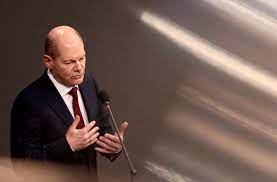By Michael Fischer and Alexander Welscher, dpa
Vilnius (dpa) – German Chancellor Olaf Scholz has promised Lithuania additional military support to deter and defend against a possible Russian attack.
“We have firmly resolved that we will step up our contribution,” the Social Democrat politician said on Tuesday after talks with Lithuanian President Gitanas Nausėda and the heads of government of all three Baltic states, which also include Latvia and Estonia.
He said German engagement should be developed “in the direction of a robust combat brigade.”
“As allies in NATO, we feel committed to each other and we will defend every inch of NATO territory in the event of an attack,” Scholz said. For the time being, the chancellor did not give details of the increased German commitment.
Nausėda pointed out that the Baltic states are “on the front line of NATO.”
“Maximum preparedness and reinforced forces in our region are key to the security of the entire alliance,” he added.
With Russia, he said, there should be “no dialogue or cooperation, no appeasement or giving in to this terrorist state.”
Latvian President Egils Levits had also urged the military alliance to deploy more troops to the region ahead of Scholz’s visit, saying he hoped the German chancellor would bring “concrete proposals.”
Currently, a German-led NATO battalion with 1,600 soldiers is stationed in Lithuania, of which more than 1,000 belong to the Bundeswehr. A brigade usually consists of about 3,000 to 5,000 soldiers.
The Baltic states have been pushing for the stationing of a NATO brigade in each of the three countries for some time. However, it is unclear how many soldiers will actually be stationed there and how many will be kept on standby outside the three countries.
The final decision on the reinforcement of NATO’s eastern flank is to be made at the NATO summit in Madrid from June 28 to 30.
In related news, Scholz said that Spain has not yet submitted a request for the export of German-made Leopard-2 tanks to Ukraine.
Should there still be such a request, it would be examined, Scholz said.
According to a report in the Spanish newspaper El País, Spain wants to supply Ukraine with German-made Leopard 2 A4 battle tanks. As a rule, the German government has to approve such arms exports because the purchase contracts contain so-called end-use clauses that provide for this in the event of a transfer.
A delivery of Leopard 2 tanks would be the first time that Ukraine would receive modern Western tanks in the fight against the Russian army.
In Germany, politicians from Scholz’s Social Democratic Party (SPD) – the senior party in the governing coalition – have so far stressed that there is an informal agreement among NATO states not to supply such weapons.
According to the newspaper report, about 40 of 108 Leopard tanks that Spain bought second-hand in Germany in 1995 could be made operational again.
With this trip to Lithuania, Scholz was visiting for the first time since the beginning of the Ukraine war a NATO country that borders on Russia and feels particularly threatened by the nuclear power.
The chancellor planned later to visit the Bundeswehr soldiers stationed in Lithuania.
At the military training area near Prabade, less than 200 kilometres from the Russian exclave of Kaliningrad as the crow flies, Scholz also wanted to get an idea of the Bundeswehr’s equipment, which includes infantry and battle tanks, heavy artillery and reconnaissance drones.
Along with Latvia, Estonia, Poland and Norway, Lithuania is one of the five NATO states that have a land border with Russia. There are missiles stationed in Kaliningrad that can reach the entire Baltic region, all of Poland and even Berlin.
Russia launched naval manoeuvres with its Baltic Sea fleet on Tuesday, coinciding with a major NATO naval exercise in the region.

Be the first to comment on "Scholz promises Lithuania reinforcements for NATO’s eastern flank"